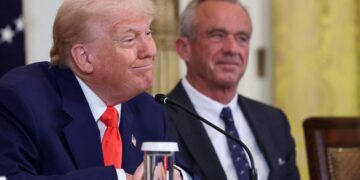Major U.S. Indices
- Dow Jones Industrial Average: Up 253 points (+0.6%)
- S&P 500: Increased by 24.37 points (+0.4%) to close at 5,631.28
- Nasdaq Composite: Gained 48.50 points (+0.3%) to finish at 17,738
Treasury Yields
- 10-Year U.S. Treasury Yield: Rose to 4.29% from 4.26% the previous day
Gold Prices
- Gold: Fell by $29 to $3,360 per ounce as of 9 a.m. ET
Mortgage Rates
- 30-Year Fixed Mortgage Rate: Increased to 6.85%
Notable Company Performances
- Tapestry Inc.: Stock rose 5% after reporting better-than-expected profits and revenue, driven by new, younger customers in North America.
- Molson Coors: Shares fell 7.4% following quarterly results that missed analysts’ expectations, citing a volatile global macroeconomic environment.
- Krispy Kreme: Stock tumbled 24.3% after withdrawing its full-year forecasts due to macroeconomic softness and pausing the rollout of doughnut sales at more McDonald’s restaurants.
What’s driving Wall Street up today?
The key driver behind Thursday’s stock market rally is a comment made by President Trump about a new trade deal with the United Kingdom. Trump posted on Truth Social that a “full and comprehensive” agreement is expected to be announced at 10 a.m. Eastern, calling it the first of “many other deals” currently in advanced stages of negotiation.
This news has sparked optimism among investors who’ve been watching for signs that tariff-related economic pressures may ease. Tariffs, especially those on Chinese goods, have been weighing on global trade and consumer sentiment.
Will this U.K. trade deal change the current U.S. tariff landscape?
Analysts are keeping a close eye on whether the U.K. trade deal will influence the 10% tariffs that Trump imposed on all imported goods during what he called “Liberation Day.” While the U.K. deal is promising, the real test will be whether larger trade partners, such as China, will come to the table under similar terms. China, the world’s second-largest economy, once again urged the United States on Thursday to drop existing tariffs ahead of upcoming talks. However, Trump reaffirmed on Wednesday that he won’t roll back the hefty 145% tariffs on Chinese goods just to start negotiations.
Are corporate earnings giving markets a boost too?
Yes, besides trade optimism, strong corporate earnings have been helping fuel the rally. Several companies have posted better-than-expected results, supporting investor confidence.
- Tapestry Inc., the parent company of Coach and Kate Spade, saw its stock jump 5% after reporting higher-than-expected profits and revenue. It credited a growing customer base, especially among younger shoppers in North America.
But not every earnings report was upbeat:
- Molson Coors shares dropped 7.4% after reporting disappointing quarterly results. CEO Gavin Hattersley said global uncertainty and trade tensions are impacting beer sales and consumer demand.
- Krispy Kreme took an even harder hit, plunging 24.3% after pulling its full-year forecast. The doughnut chain cited “macroeconomic softness” and a pause in expanding its doughnut sales through McDonald’s locations.
How is the overall u.s. economy holding up right now?
Despite all the market swings and tariff concerns, the U.S. economy is still showing signs of resilience. The Federal Reserve noted on Wednesday that the economy appears to be running at a solid pace beneath the surface.
However, recent data has shown mixed signals:
- The number of people applying for unemployment benefits dipped slightly last week, offering a positive sign.
- On the other hand, worker productivity dropped more than expected in the first quarter of 2025, which may lead to higher inflation—especially if tariffs continue to raise the cost of imports.
These mixed indicators highlight how fragile the current economic environment remains, and why markets are responding so strongly to any hint of trade progress.
What’s happening globally with interest rates and markets?
While U.S. stocks pushed higher, global markets had a more muted response. In London, the FTSE 100 slipped 0.1% after the Bank of England announced a quarter-point rate cut to support economic growth.
Across Europe and Asia, most indexes posted modest gains. Investors worldwide are watching closely to see how trade talks, inflation trends, and interest rate decisions unfold in the coming weeks.
What could happen next for wall street and trade negotiations?
Markets are bracing for more updates in the coming days, especially with possible high-level U.S.-China talks expected this weekend. If more trade deals emerge—or at least signs of serious negotiation—it could extend the recent rally in stocks and ease fears of a recession.
But for now, uncertainty remains a major factor. From tariffs to corporate earnings to economic data, Wall Street will continue to move on headlines. What happens with trade, especially with China, could be the deciding factor for where markets head next.
FAQs:
Q1: Why is Wall Street rising today?
Wall Street is rising due to optimism around a new U.K. trade deal announced by Donald Trump.
Q2: How are trade deals affecting recession fears?
Trade deals could reduce tariffs and help prevent a U.S. economic recession.




















